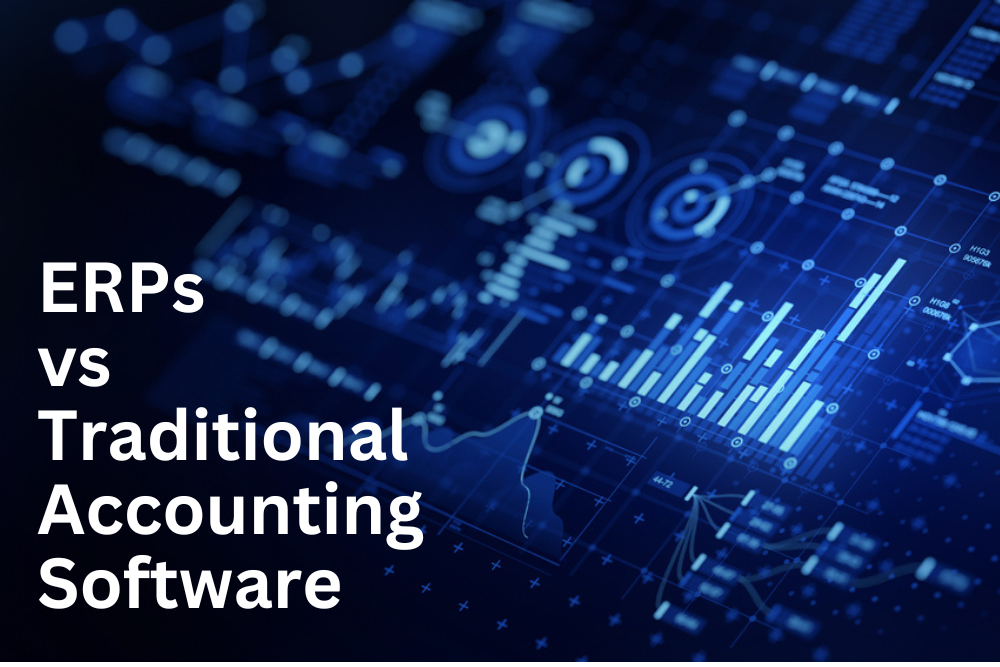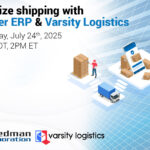
When manufacturers first start, they often rely on traditional accounting software like QuickBooks to handle their financial management needs. These tools can be effective in the early stages but may reveal limitations as operations grow and become more complex. To address these challenges, you should use ERP accounting software for a more comprehensive and integrated solution that scales with their business needs.
Understanding ERP Systems
An ERP system is a comprehensive software platform used by organizations to integrate and manage their core business processes. This includes functions such as financial management, sales, inventory control, production planning, supply chain management, and more. By managing these processes with a single system, ERPs provide one source for all departments to access real-time data. This holistic approach not only streamlines operations but also enhances efficiency and decision-making capabilities.
Financial management is a critical component of an ERP system. Unlike traditional accounting software, ERP accounting software integrates financial data with other business functions, ensuring accuracy and consistency across the board. This integration allows for real-time financial reporting, automated workflows, and comprehensive analytics, which are essential for informed decision-making and strategic planning.
Limitations of Traditional Accounting Software
Traditional accounting software is designed primarily to handle basic financial tasks such as invoicing, payroll, and tracking expenses. While it’s suitable for small businesses, it often falls short when trying to meet the needs of larger or custom manufacturers.
As compared to ERP accounting software, traditional financial software constraints include:
Restricted Integration
Typical accounting software often operates in isolation. It also does not integrate well with other business operations like ERP accounting systems do. Lack of integration can lead to data silos. This makes it difficult for you to get a comprehensive view of your business as a whole.
Manual Data Entry
Without integration, financial data must often be entered manually or imported from different file formats (ie. .xls, .csv). This increases the risk of errors and consumes valuable time. Manual entries or data imports can lead to financial record discrepancies, which is problematic during audits or financial reviews.
Lack of Real-Time Data
Off-the-shelf accounting software doesn’t provide you with real-time visibility to departmental information. These applications typically update financial data periodically, which may not reflect the most current financial status. Businesses need to make financial decisions quickly in a fast-paced manufacturing environment. Delays in data updates can hinder the ability to respond to market changes and operational issues promptly.

Traditional accounting software packages, like Quickbooks, require manual entry and have limited ability to scale with your company.
Scalability Issues
As a manufacturing business grows, the limitations of traditional accounting software become more apparent. It may struggle to handle the increased volume of transactions and data, leading to performance issues and inefficiencies. This lack of scalability can be a significant barrier to growth for your business during expansion.
Basic Reporting and Analytics
Accounting software packages typically offer basic reporting and analytics like accounts payable and general ledger features. These are not sufficient for the complex financial analysis required by manufacturing companies. Features like advanced reporting, forecasting, and data analytics are often lacking. Their absence limits your ability to gain deep insights into financial performance and trends.
Limited Automation
Traditional bookkeeping software may not support the automation of routine financial processes such as invoicing, payroll, and expense tracking. This means more manual work for the finance team, reducing overall efficiency and increasing the risk of human error.
Inadequate Compliance and Security
Ensuring compliance with industry-specific regulations and standards is critical for manufacturing companies. Typical accounting software may lack robust compliance features and security measures, making it challenging to maintain transparency and protect sensitive financial data.
ERP Accounting Software Benefits
In contrast, ERP accounting software addresses traditional package limitations by offering a more integrated and scalable solution for financial management. Here’s how financial management within an ERP system can benefit your manufacturing company:
1. Integration Across All Business Functions
The largest advantage of ERP systems for manufacturing is their ability to integrate all business functions into one system. This means that your financial data is automatically updated and synchronized with other departments. These include inventory, production, procurement, and sales.
Example: The ERP system automatically updates inventory levels, generates invoices, and adjusts financial records without any manual intervention when sales are made.
Integration eliminates data silos so everyone can access real-time data, leading to more efficient and streamlined operations. In addition, ERP accounting software combines financial data with other operational data. This helps your company conduct precise cost analyses, identify cost-saving opportunities, and optimize financial resources more effectively.
2. Real-Time Data and Reporting
The best manufacturing ERP systems provide real-time data and reporting capabilities, which are essential for effective financial management. With real-time data, you can make decisions quickly, respond to market changes, and identify potential issues.
Example: ERP accounting software can generate real-time financial reports, such as profit and loss statements, balance sheets, and cash flow statements. This enables manufacturers to monitor their financial health continuously and make proactive adjustments as needed.
ERP accounting software helps with risk management too. This provides you with extra safeguards against both internal and external threats like fraud and theft. Systems like Frontier ERP include user-specific controls, comprehensive reporting, and audit trails to ensure fiscal transparency and accountability.
3. Automated Financial Processes
Automation is a key feature of ERP accounting software that can significantly improve your company’s financial management. By automating routine tasks such as invoicing, payroll, and expense tracking, ERP systems reduce the risk of manual errors. This frees up valuable time for financial managers to focus on more strategic activities.
Example: An ERP system can automatically reconcile bank statements and generate financial reports, all with minimal human intervention. This not only improves accuracy but also increases efficiency and productivity.

Frontier ERP’s robust reporting and analytics give you deep insight to the overall financial health of your business.
4. Scalability and Flexibility
The best ERP accounting systems are designed to scale with your growing business. They differ from traditional accounting applications which may struggle to handle increased data and transaction volumes. Additionally, some ERP systems offer flexibility in customization and configuration. Manufacturers can adjust the software by adding or changing features to support a variety of business processes.
As a scalable ERP, Frontier streamlines operations for manufacturers with multiple locations and can manage multi-currency financial processing. Frontier offers many industry-specific ERP packages that are both flexible and scalable. However, our expert team can customize your ERP accounting software to suit your unique business needs.
5. Enhanced Financial Control and Compliance
With ERP accounting software, you can have greater financial control and compliance with industry regulations and standards like GAAP. ERP systems provide robust audit trails, security features, and compliance reporting capabilities that help manufacturers maintain transparency and accountability.
Example: ERP accounting software can track all financial transactions and provide a clear audit trail for internal or external auditors. This helps manufacturers meet regulatory requirements and avoid potential fines or penalties.
Financial closing involves reconciling bank statements, AR and AP review, and ensuring that all financial documents are accounted for. Utilizing ERP accounting software helps you streamline this process, making it easier to identify discrepancies.
Don’t forget about filing taxes! Ensuring the accuracy and completeness of all financial records before filing taxes is crucial. Frontier ERP integrates with Avalara tax software, easing the burden of compliance. This is just one of the many ways ERP accounting software can improve your financial management.
6. Improved Cash Flow Management
Effective cash flow management is crucial for the financial health of any manufacturing business. ERP accounting software provides tools and insights that help manufacturers optimize their cash flow.
Example: An ERP system can generate real-time cash flow forecasts, helping you predict future needs and plan accordingly. It can also automate accounts receivable and payable processes for timely payments and collections.
7. Improved Decision-Making
With real-time data, comprehensive reports, and advanced analytics, ERP accounting software empowers manufacturers to make better-informed decisions. Financial managers can analyze trends, identify opportunities for cost savings, and develop strategies to improve profitability.
Example: An ERP system can provide insights into production costs, allowing manufacturers to identify inefficiencies and implement cost-saving measures. It can also help you assess the financial effects of different situations. This includes launching a new product or entering a new market.
Financial Management with Frontier ERP
At Friedman, we recognize the distinct needs of product manufacturers. Our Frontier ERP system is designed to meet those needs by combining powerful financial tools with industry-specific features. Here’s why Frontier ERP accounting software is the right choice for you compared to traditional accounting packages:

- Comprehensive Financial Suite: Frontier ERP includes modules for general ledger, accounts payable, accounts receivable, cash management, and more. Our ERP accounting software provides you with a complete financial toolkit that surpasses the capabilities of traditional accounting software.
- Cross-Departmental Visibility: By connecting finance, production, inventory, and sales, Frontier ERP offers valuable financial insights that affect various aspects of your business. In contrast, traditional packages often work in silos.
- Profitability Analysis: Monitor profitability by product line, project, or customer to identify areas for improvement and seize new opportunities. Traditional accounting packages typically lack analytical depth and integration offered by Frontier ERP accounting software.
- Scalability: Frontier ERP supports both medium-sized manufacturers and large enterprises as they expand and evolve. Whereas typical accounting software may struggle to keep up with your business’s increasing complexity and scale.
Conclusion
As manufacturers continue to grow and evolve, the limitations of traditional accounting software become increasingly apparent. ERP accounting software provides a more integrated, automated, and scalable solution for financial management. This holistic approach ensures that financial data is consistently accurate and up-to-date across all business functions.
Frontier ERP stands out by offering cross-departmental visibility, advanced profitability analysis, and scalability to support businesses of all sizes. Frontier ERP stands out from standard ERP systems and accounting packages. With its advanced features, manufacturers can streamline financial management, improve accuracy, and gain a competitive edge in their industry.
Are you ready to ditch your cumbersome accounting package and want to learn more about Frontier ERP? Contact us today for a demo!



